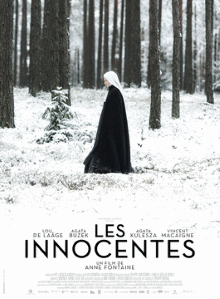
Since we’ve started watching films in earnest we’ve actually been making quite a bit of headway against our list. This is why the films being covered here have been trending towards newer releases. This is a French-Polish production that was released only this year but has become noteworthy enough among critics to earn a place in my lists.
Mathilde Beaulieu is a young volunteer medical officer serving with the French Red Cross mission in Poland shortly after the Second World War. She is approached by a Polish nun who needs help. At first she demurs as she is only supposed to help the French but gives in after she sees the nun praying patiently in the snow outside. She follows the nun back to her convent and discovers that the patient is a pregnant woman whose complications necessitate a Caesarean section. After witnessing another pregnant nun fainting, she is finally told that their convent have been periodically invaded by Russian soldiers who raped the nuns. Out of shame and fear that the convent will be closed and the nun forced to leave should this be publicly known, the Mother Superior insists that it be kept secret. Her attempts to give the nuns proper medical attention is further complicated by how the nuns are torn between guilt, shame and their determination to uphold their vows of chastity even though they are pregnant.
The film opens with a statement saying that it’s based on a true story but it plays out a bit too neatly to be realistic and indeed a cursory reading indicates that it’s based on some experiences but not any specific episode. I do like the somber mood of the piece and the slow though predictable reveal of the nuns’ predicament. The characters and acting are all excellent and I like that there are meaningful differences between how each of the nuns grapple with the horror that has been inflicted on them. Even side characters like Gaspard, Mathilde’s superior at the hospital, are interesting with him him being at once somewhat of a cynical creep and at the same time being earnest and sincere about helping when called upon.
Ultimately however this is a film about faith and how it holds up in the face of horror. In this regard while it examines multiple perspectives it doesn’t really explore the subject as deeply as I’d like. In particular, the film frames the Mother Superior, the most conservative of the nuns, as the villain of the story. In effect, the film explicitly takes the side that faith and religious principle must inevitably give way before practical reality. While this is certainly a grounded stance, it feels unsatisfying to have a film about religion conclude that religion doesn’t really matter much after all. For example, Mathilde is introduced as being raised by Communist parents and therefore not religious at all. There’s potential there to explore what she missed out on and hence the value of religion so it’s disappointing that the interaction is all one way only as she never gains any new insight on religion.
Overall I found this to be a competently made film about a heavy subject that it doesn’t quite do justice to. It’s still good enough that I’d happily recommend it but it isn’t the outstanding film that I’d hoped it might be.